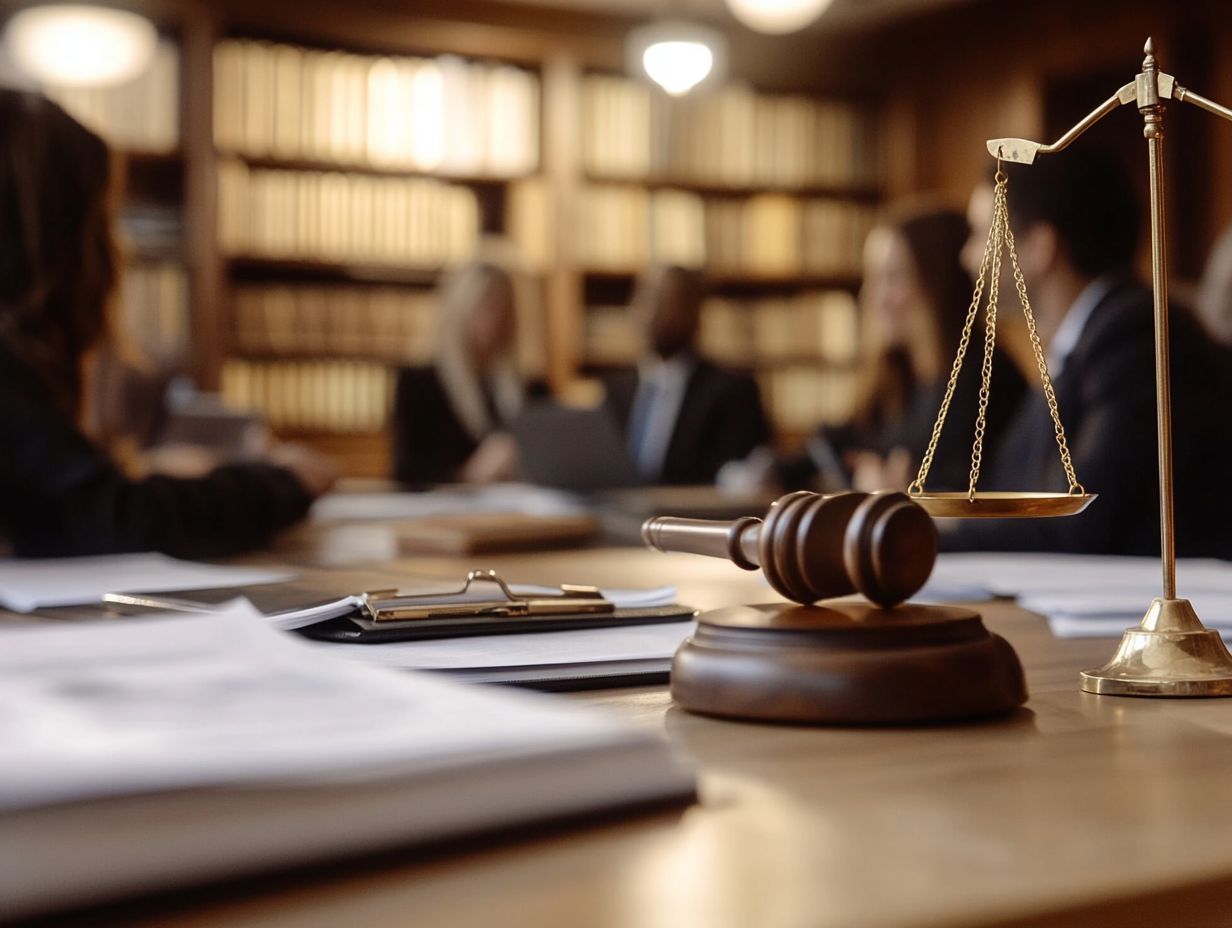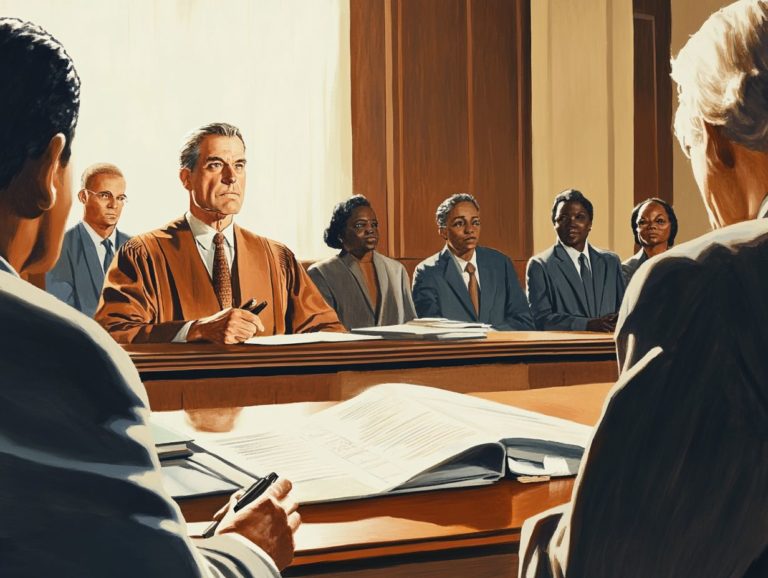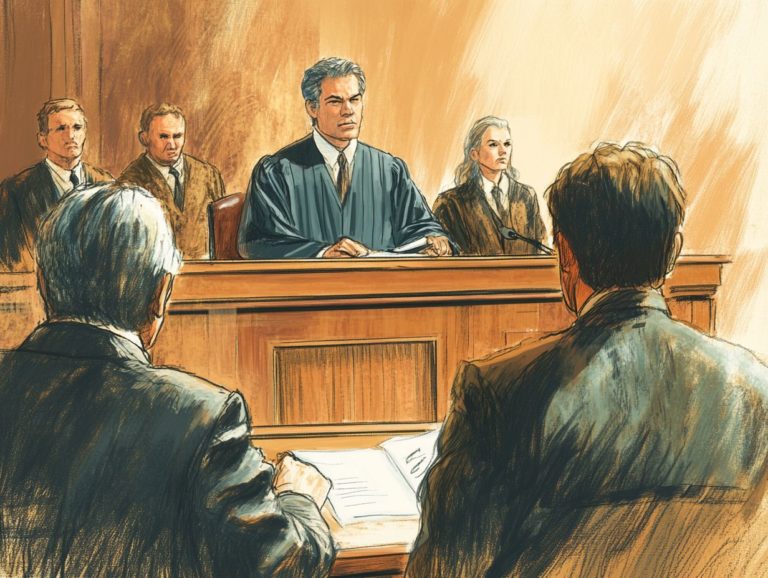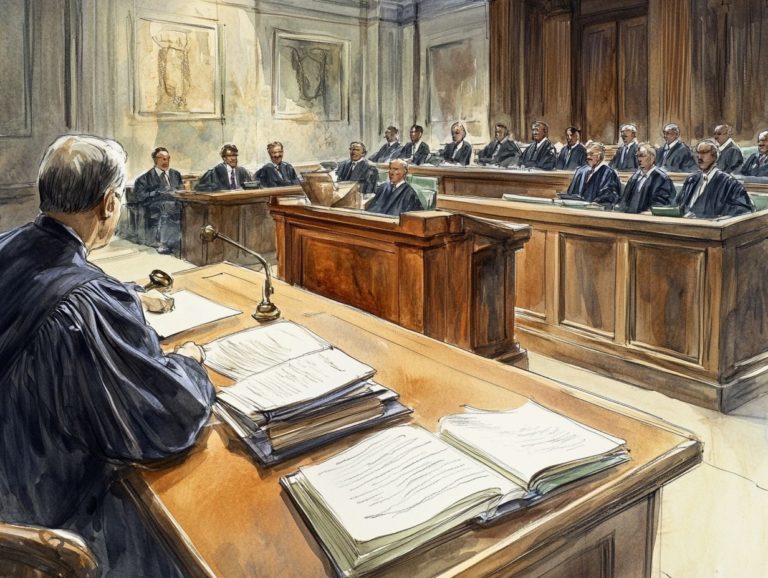Navigating the Complexities of Defense Law
Defense law stands as a cornerstone of the legal system, including a diverse array of practices that range from criminal and civil cases.
Grasping its definitions, types, and the crucial role of defense attorneys equips you with the knowledge needed to navigate legal challenges effectively.
This guide delves into the intricacies of defense law, offering strategies for constructing a robust defense, maneuvering through legal procedures, and overcoming common obstacles.
Whether you re a law student or simply seeking clarity on your legal rights, this exploration is bound to provide you with valuable insights.
Contents
- Key Takeaways:
- Understanding Defense Law
- Types of Defense Law
- The Role of a Defense Attorney
- Building a Defense Strategy
- Navigating the Legal Process
- Challenges in Defense Law
- Frequently Asked Questions
- What is defense law and why is it important?
- What are the different types of defense law cases?
- What are the key skills needed to navigate the complexities of defense law?
- What are the potential consequences of not having proper legal defense representation?
- How can I find a competent defense lawyer?
- What should I expect during the defense law process?
Key Takeaways:

Get ready to grasp the essentials of defense law! Defense law includes both criminal and civil cases, and requires a thorough understanding of legal procedures and strategies.
A defense attorney plays a critical role in building a strong defense strategy and navigating the complexities of the legal process.
Challenges in defense law can arise from common obstacles, but they can be overcome with careful consideration and effective tactics.
Understanding Defense Law
Understanding defense law is essential for anyone navigating the intricate landscape of legal challenges within the criminal justice system, particularly in Monticello, NY, where you may encounter a range of criminal charges, from misdemeanors to felonies.
This area of law covers your right to representation, fair trials, and the presumption of innocence, ensuring that you have access to skilled defense attorneys who can construct a strong defense against the allegations you face.
Delving into the nuances of defense law also means familiarizing yourself with the various strategies available to safeguard your rights and strive for favorable outcomes in court.
Types of Defense Law
Defense law includes a range of specializations, mainly focused on criminal and civil cases, each tailored to meet distinct legal needs and uphold individual rights.
In criminal defense, individuals confront allegations of crimes, ranging from misdemeanors to felonies. In contrast, civil defense addresses conflicts between private parties.
Grasping the nuances of self-defense laws and the specific circumstances that warrant justifiable force is essential for crafting robust legal strategies.
Criminal Defense
Criminal defense is a specialized area of law that safeguards individuals accused of crimes, ensuring that your constitutional rights are upheld during the arrest process and throughout the legal proceedings.
A skilled defense attorney becomes your ally, navigating the complexities of criminal charges, from pre-trial motions to the trial itself, while diligently crafting a robust defense strategy.
This journey begins with a meticulous examination of the arrest and evidence collection, highlighting the critical importance of adhering to proper procedures to avoid potential violations of rights.
Your defense attorney takes on the vital role of carefully checking the prosecutor’s claims, seeking out inconsistencies or weaknesses that could be turned to your advantage.
Utilizing a range of defense strategies, such as asserting self-defense or wrongful arrest, can significantly sway the outcome of your case.
A comprehensive approach to criminal defense not only strives for a favorable result but also ensures that justice is served fairly and impartially.
Civil Defense
Civil defense provides you with legal representation when facing disputes that require resolution outside the realm of criminal proceedings think personal injury claims or property disagreements. Grasping the intricacies of civil law is crucial for crafting effective strategies that take situations that lessen the impact of a problem into account, ensuring you receive fair treatment within the legal system.
Such representation is vital, as navigating the complexities of civil cases can be quite daunting without the right guidance.
Common types of civil cases you might encounter include:
- Contract disputes
- Family law matters
- Employment issues
Each of these can significantly affect your daily life. Legal professionals play an essential role in advocating for your rights, helping to safeguard your interests through mediation, arbitration, or litigation. By fostering a clear understanding of your rights and responsibilities in these civil matters, you enable yourself to make informed decisions, paving the way for a smoother resolution process in disputes.
Now that you understand the essentials, it s time to take control of your legal journey!
The Role of a Defense Attorney

The role of a defense attorney is crucial in the criminal justice system. They protect your rights every step of the way when you’re accused of a crime.
A defense attorney’s duties include offering legal counsel and gathering evidence. They maintain clear communication with you to discuss defense strategies and court requirements.
They navigate the complex procedures of pre-trial motions and the trial process. Their aim is to maximize your chances of a favorable verdict.
Responsibilities and Duties
A defense attorney carries many responsibilities. Their primary role is to provide effective legal representation to guarantee that you receive your fair trial rights throughout the entire legal process.
This involves diligently gathering evidence and analyzing your legal options. They strategize with precision to influence the determination of the verdict.
Your attorney will meticulously examine all available evidence and interview witnesses. They will also consult with experts to construct a strong case.
Effective advocacy goes beyond mere fact-finding. It requires skillful navigation of courtroom procedures and the ability to articulate compelling arguments on your behalf.
They must also be sharp in recognizing and challenging any procedural errors or rights violations. These can significantly impact the outcome of your trial.
Their role even extends to negotiating plea bargains when appropriate. Plea bargains are agreements in which you may plead guilty to a lesser charge, ensuring your best interests remain the focus throughout the proceedings.
Building a Defense Strategy
Creating a strong defense strategy is vital for your future. You need to fully understand your case, considering the specifics of the criminal charges, your criminal history, and the evidence at hand.
A carefully crafted defense strategy is crucial for maneuvering through the intricacies of the legal system. It enhances your chances for favorable outcomes in court.
Key Considerations and Tactics
When crafting a defense strategy, consider various factors. This includes the potential for plea negotiations, the strength of community support systems, and the overall trial process you’ll navigate.
You must employ effective tactics to explore every avenue for achieving a favorable outcome in your case. Understanding the intricacies of plea bargaining can significantly change the course of your case.
Acting fast on plea negotiations can often open doors to reduced charges or lighter sentences. Simultaneously, cultivating a robust support network is crucial.
A support network can uplift your morale and help alleviate the emotional toll that often accompanies legal struggles. Building relationships with community leaders and engaging with local organizations can foster public sentiment in your favor.
Ultimately, a comprehensive defense strategy should focus not only on legal maneuvers but also on the broader social dynamics at play.
Navigating the legal process can feel overwhelming for those facing criminal charges. It involves a series of crucial steps from the initial arrest to trial and possible sentencing hearings.
By understanding the court requirements and recognizing the importance of active participation, you can significantly influence the outcome of your case. Ensure that you receive the representation you deserve.
Steps and Procedures

A criminal case has several important steps. Each step is crucial for achieving justice and protecting the rights of the accused.
Your journey typically begins with an investigation. Law enforcement gathers evidence, which prosecutors then examine to decide if formal charges are warranted.
The next step is the arraignment. Here, you ll be formally presented with the charges and allowed to enter a plea.
If your case moves forward, pre-trial motions may arise. These can include requests to suppress certain evidence or challenge the legality of the arrest.
During the trial, you will see jury selection, presentation of evidence, and witness testimonies. This methodical progression is key for maintaining a fair judicial process and upholding the principle of due process.
Challenges in Defense Law
In defense law, you may face many legal challenges during prosecution. These include rights violations, disputes over evidence, and the risk of unfavorable verdicts.
Understanding these obstacles is vital to crafting effective strategies and seizing opportunities for appeal.
Common Obstacles and How to Overcome Them
Obstacles in defense law can hinder your defense strategy. Innovative approaches are necessary to tackle them effectively.
Utilizing community support and exploring rehabilitation programs can help you overcome these challenges. Get involved in your community to make a real difference!
One major hurdle is public opinion’s influence, which can compromise juror impartiality. Engaging in community outreach can foster understanding and reshape narratives positively.
Resource limitations often hinder effective legal representation. By leveraging local legal aid organizations or mentorship programs, you can access valuable assistance.
Cultivating relationships with rehabilitation services may offer alternatives to incarceration. This can lead to lenient sentencing and smoother reintegration into society.
Together, these strategies address legal complexities while promoting a more holistic approach to defense.
Frequently Asked Questions
What is defense law and why is it important?
Defense law is about helping people facing legal charges. It s important because everyone deserves fair representation to protect their rights and interests.
What are the different types of defense law cases?

- Criminal defense: Representing individuals accused of a crime.
- Civil defense: Representing individuals or organizations in non-criminal lawsuits.
- White-collar defense: Defending individuals or organizations accused of financial crimes.
- Appellate defense: Focusing on appealing a lower court’s decision.
To navigate defense law, one needs strong legal knowledge and analytical skills. Excellent communication and negotiation skills are essential, along with attention to detail, critical thinking, and the ability to handle high-pressure situations.
What are the potential consequences of not having proper legal defense representation?
Not having proper legal defense representation can lead to serious consequences. You may be wrongfully found guilty of a crime and face harsher penalties.
This situation can also harm your reputation. You might lose a civil case or miss the chance to appeal a decision.
How can I find a competent defense lawyer?
Finding the right defense lawyer can change everything for your case! Start by researching law firms in your area and reading reviews.
Ask for recommendations from trusted sources. You should also schedule consultations to discuss your case and evaluate their qualifications.
What should I expect during the defense law process?
During the defense law process, expect a thorough discussion with your lawyer about your case. You’ll talk about potential strategies and possible outcomes.
Your lawyer will manage all legal proceedings, from investigations to court appearances. Expect regular updates and clear communication throughout the process.






